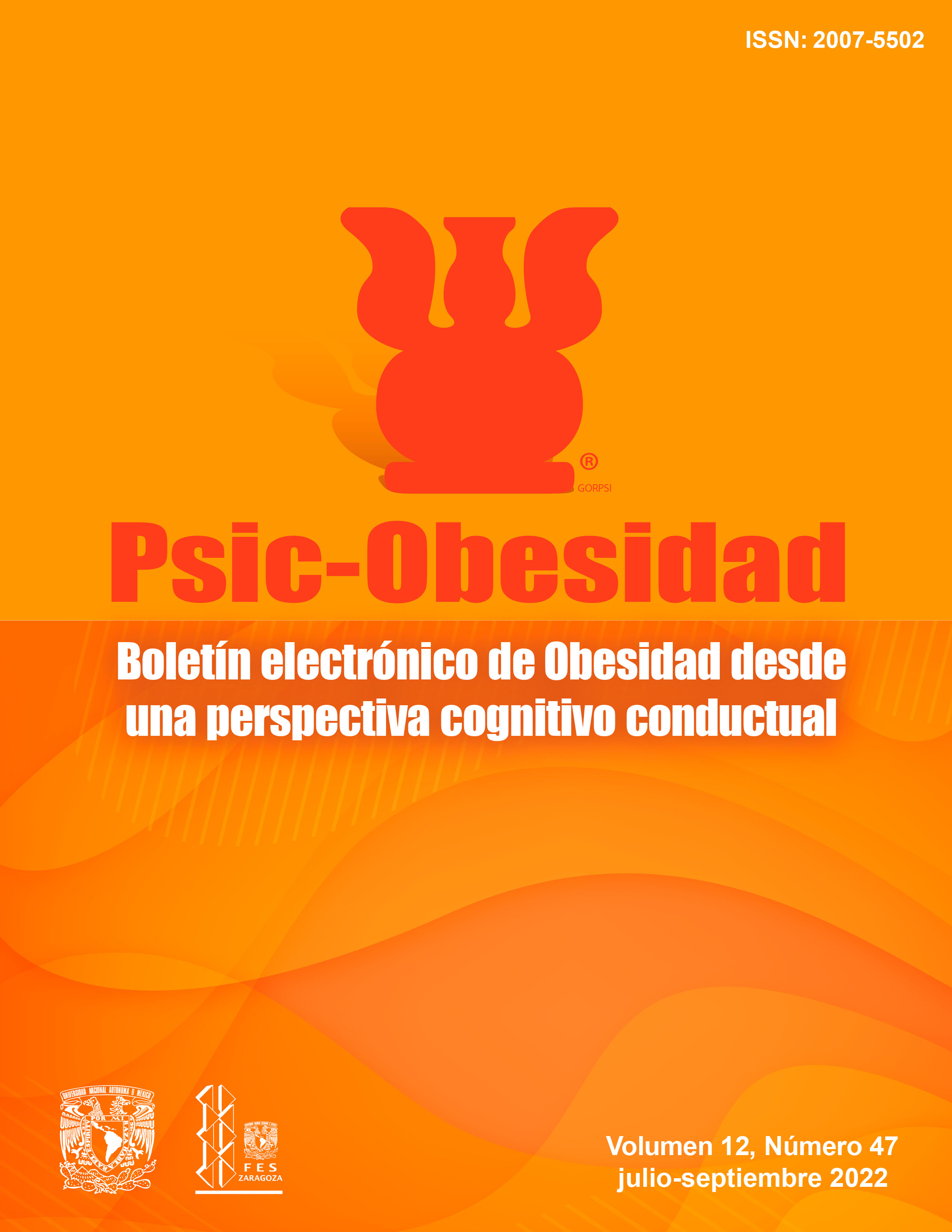Adaptive activation, risk factors and eating behavior in pandemic
Main Article Content
Abstract
The time of confinement and forced social isolation has been gradually changed by the opening to face-to-face social, educational and recreational activities. Carrying out activities “away from home” implies the effort to change habits and to adapt again to social encounters, to face-to-face work and to classes with teachers and students with measures to prevent SARS-CoV-2 infection. Leaving home represents the activation of adaptive processes composed of learned socialization and few social encounters, leading to emotional expressions, cognitions, behaviors, and social aspects shaped by the pandemic. This article reviews the psychological and social factors related to adaptive activation and eating behavior in the post-pandemic period that lead the population to resume face-to-face activities considering the changes brought about by the pandemic. Among the factors to be considered will be the coping style, the psychological and social impact, as well as the proposals for primary health intervention that lead to consider the planning and implementation of workshops on healthy eating behavior, allowing people more knowledge for proper decision making to maintain overall health.
Downloads
Article Details
Citas en Dimensions Service
References
Al-Naser, F., & Sandman, M.M. (2000). Evaluating resiliency patterns using the ER89: A case study from Kuwait. Social Behavior and Personality, 28, 505-514. DOI:10.2224/SBP.2000.28.5.505 DOI: https://doi.org/10.2224/sbp.2000.28.5.505
Brooks, S.K., Webster, R.K., Smith, L.E., Woodland, L., Wessely, S., Greenburg, N., & Rubin, G.J. (2020). The psychological impact of quarantine and how to reduce it: rapid review of the evidence. Lancet. 395(10227), 912-920. DOI: 10.1016/S0140-6736(20)30460-8. DOI: https://doi.org/10.1016/S0140-6736(20)30460-8
Fisher, M. (22 de abril de 2022) ¿Cómo será nuestra nueva vida normal? Tenemos algunas pistas. https://www.nytimes.com/es/2020/04/22/espanol/coronavirus-vida-normal.html
Fluharty, M., & Fancourt, D. (2021). How have people been coping during the COVID19 pandemic? Patterns and predictors of coping strategies amongst 26,580 UK adults. BMC Psychol, 9(1), 1-12. https://doi.org/10.1186/s40359-021-00603-9. DOI: https://doi.org/10.1186/s40359-021-00603-9
Folkman S. (2013). Stress: appraisal and coping. En: Gellman M.D., & Turner, J.R., editors. Encyclopedia of Behavioral Medicine. Springer; 1913–1915. DOI: https://doi.org/10.1007/978-1-4419-1005-9_215
Frydenberg, E. & Lewis, R. (1996). The Adolescent Coping Scale: multiple forms and applications of a self-report inventory in a counselling and research context. European Journal of Psychological Assessment, 12, 216-227. DOI: 10.1027/1015-5759.12.3.224 DOI: https://doi.org/10.1027/1015-5759.12.3.224
González-Arratia López- Fuentes, N.I., & Valdez-Medina, J.L. (2013). Resiliencia: Diferencias por Edad en Hombres y Mujeres Mexicanos. Acta de Investigación Psicológica, 3 (1), 941 - 955. https://www.scielo.org.mx/pdf/aip/v3n1/v3n1a4.pdf DOI: https://doi.org/10.1016/S2007-4719(13)70944-X
Guillén-Riebeling, R.S. (2022). Qué factores psicológicos y socioculturales emergen en la pandemia. Noticias reales o falsas. Taller Servicio Social O.S.S.E.A. Inédito.
Kettl, D. F. (2005). The worst is yet to come: Lessons from September 11 and Hurricane Katrina. Fels Institute of Government. University of Pennsylvania.
Lazarus, R.S. & Folkman, S. (1991). Estrés v procesos cognitivos. Roca.
Luengo-Latorre, J.A. (2022). Salud mental y centros educativos: el valor de las distancias cortas. copmadrid.org/wp/salud-mental-y-centros-educativos-el-valor-de-las-distancias-cortas/
Organización Mundial de Salud (OMS) (16 de marzo de 2022). La salud mental en las situaciones de emergencia. https://www.who.int/es/news-room/fact-sheets/detail/mental-health-in-emergencies.
Patiño, L. (2022). México, en camino a una crisis alimentaria. https://alianzasalud.org.mx/2022/05/mexico-en-camino-a-una-crisis-alimentaria/.
Robles J. I. y Medina J. L. (2008). Manual de salud mental en desastres. Síntesis.
Robles Sánchez, J.I. (2020). La psicología de emergencias ante la COVID-19: enfoque desde la prevención, detección y gestión operativa del riesgo. Clínica y Salud, 31(2), 115-118. https://dx.doi.org/10.5093/clysa2020a17. DOI: https://doi.org/10.5093/clysa2020a17
Rodríguez de Elías, R. (2003) El afrontamiento al estrés y factores de riesgo asociados a la conducta alimentaria. Tesis Licenciatura, Facultad de Psicología. Inédita.
Rodríguez-Hernández, C., Medrano-Espinosa, O., & Hernández-Sánchez, A. (2021). Salud mental de los mexicanos durante la pandemia de COVID-19. Gac Med Mex, 157, 228-233. DOI: 10.24875/GMM.20000612. DOI: https://doi.org/10.24875/GMM.20000612
UNESCO (2020). COVID-19: Problemas sociales y psicológicos en la pandemia. https://www.unesco.org/es/articles/covid-19-problemas-sociales-y-psicologicos-en-la-pandemia
WEB Financiero (31-07-2022). Covid-19 en México. Julio es el segundo mes con más contagios en lo que va del año. https://www.elfinanciero.com.mx/salud/2022/07/31/ covid-19 -en-mexico-julio-es-el-segundo-mes-con-mas-contagios-en-lo-que-va-del-ano/




